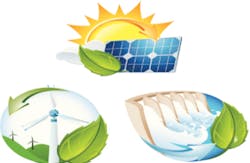Water and Energy 2013 conference to be held Sept. 25-26 in Houston
HOUSTON — The energy-water nexus is very much a reality. Extensive energy is needed for water operations (treating water, moving water, etc.). And extensive water is needed in the production of energy. In fact, the energy sector is one of the biggest users of water among industries in the U.S. and around the world.
Last year, Global Water Intelligence, in partnership with WestWater Research, produced an impressive series of conference programs that addressed the business development opportunities within water rights trading and water resource development.
These conference events recognized that water is a critical component of the country’s (and the world’s) economic future. Issues such as the evolving available water supply, environmental regulations, project development/project management, water efficiency, improved water technology, the industrial-water nexus, etc. — including the energy-water nexus — were extensively addressed over a series of three conference events that took place in Arizona, California and Texas. The series of events attracted an impressive crowd of attendees — investment managers, energy/utility senior executives, engineering consultants, water right owners, water resource managers, etc. along with municipal/local government leaders.
In 2013, Global Water Intelligence has once again teamed up with WestWater Research to execute a series of conference programs. Earlier in the year, a two-day conference event in California was produced that addressed water and agriculture. Topics included the merits of green investing, the impact of climate change, a government role to help facilitate water investment opportunities, water reuse, groundwater banking, the water-energy-agriculture nexus, etc.
An upcoming conference event will also be hosted by Global Water Intelligence and WestWater Research. Entitled “Water and Energy 2013,” it will seek to provide a strategic perspective when it comes to water sourcing and water management and its impact on industry, energy and growth. A big challenge in the U.S. and most regions of the world — how to better develop and manage water assets as well as the pricing of water — within a political arena that is seeking to regrow a manufacturing/industrial base in order to help re-energize economic growth in this country and around the world.
The upcoming conference event will take place in Houston, Texas September 25-26. It will actively bring together the many leaders from the business, academia and government arena in order to debate the issue of the whole water cycle: Water sourcing, water treatments, water use/water re-use in the petrochemical arena, water usage in thermo power generation, water usage in heavy industry, etc.
Global Water Intelligence recognizes that Texas oil production has doubled since 2010. And all this additional generated cash flow is creating unprecedented demand for both power and water just as it did in Jubail, Saudi Arabia five years ago. Notes Global Water Intelligence, “In Texas, as in Saudi Arabia, water is a bigger problem than energy, but the two are inextricably linked. We will be looking into all the issues surrounding this at the Water and Energy 2013 conference in Houston.”
Co-chaired by Amanda Brock who is the CEO of Water Standard and Clay Landry who is the managing director of WestWater Research, the upcoming two-day conference program will address a number of interesting timely topics. Notable sessions of interest: A strategic vision for water and energy in North America, current water technology development for the oil and gas sector, water management within the petrochemicals industry, water scarcity and the evolving shale revolution.
As Clay Landry observes, “Soaring water handling costs, evolving regulatory rules, increased water scarcity and waste disposal challenges have created growth opportunities and investments in the oil and gas industry as well as the water sector. We are pleased to have put together a particular panel of experienced investors and entrepreneurs to discuss their perspective on exploring and allocating capital to this particular emerging water industry sector.”
Important to note — there will be a much anticipated keynote address by the Lieutenant Govenor of Texas David Dewhurst on the opening day of the conference program.
According to Amanda Brock, the lieutenant governor very much understands that “the rapid development of shale gas resources provides an unprecedented opportunity for the U.S to achieve greater energy independence along with job creation, and growth of both the upstream and downstream industrial and power sectors.” Unfortunately, the water issue/challenge could potentially stand in the way of the economic revolution that the expansion of the shale gas energy sector can help deliver. As a result, it is imperative that “leaders of industry and government more effectively sort out how the competing demands for water can be best balanced.”
And while the conference program is very focused on Texas, attendees from around the country and from the Mexican border states are encouraged to attend. Many of the challenges and opportunities impacting Texas are comparable to those being faced in other parts of the country and border areas. How Texas elects to manage their water challenges, their evolving water-industry nexus, the water-energy nexus and their ongoing border water partnerships and challenges (both domestic and international) can be of great interest to other states of the U.S., to Mexico and even other regions of the world.
Visit http://www.waterenergystrategy.com to learn more about the upcoming conference program and to register.
